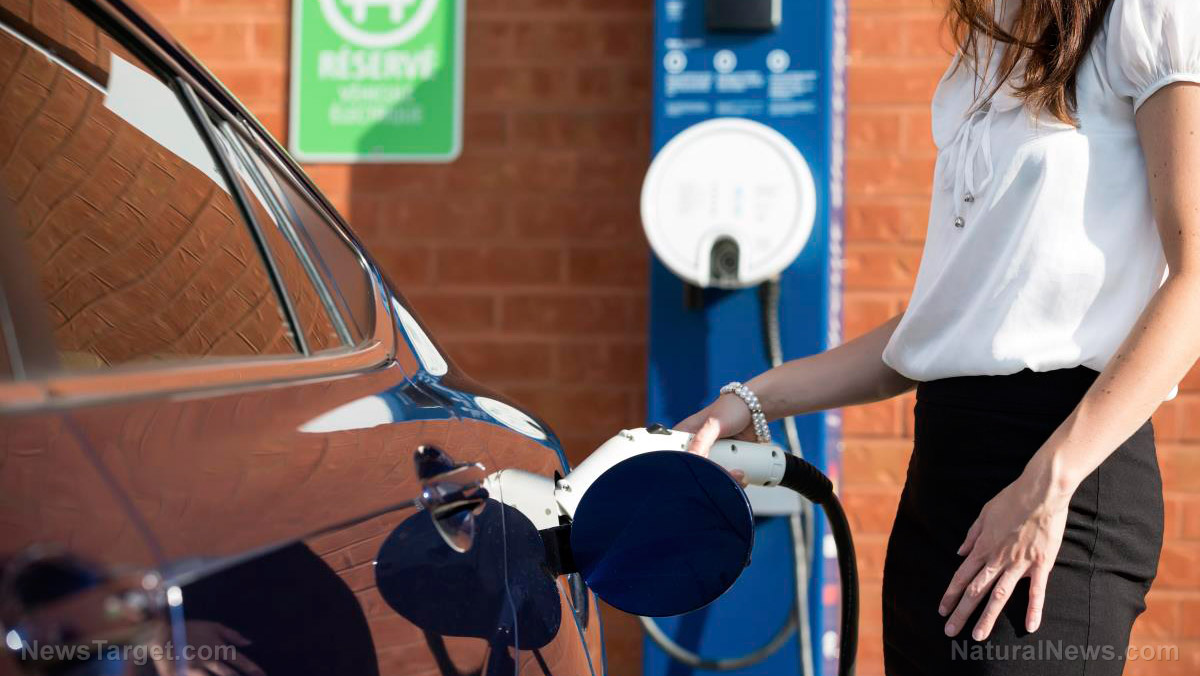The Democrat’s plan to force Americans to drive electric vehicles just got even more EXPENSIVE
04/10/2022 / By Lance D Johnson

According to Kelly Blue Book, the cost to manufacture an electric vehicle (EV) is currently $56,437. An EV is two to eighteen times more expensive than a reliable, combustion engine vehicle. The cost to manufacture these batteries has slowly dropped in the past few years; however, recent cost spikes for nickel and lithium carbonate could drive up the cost of an EV by $7,000 this year alone.
Electric vehicle prices to jump 15%, as Chinese raw materials skyrocket in cost
Prices of lithium carbonate have quintupled in the past year. Lithium carbonate is a key ingredient in the manufacture of batteries for the EV. Right now, lithium carbonate costs around $74k per ton, and much of this supply comes from China and Russia. Chinese lithium carbonate costed roughly $12,000 per ton in July of 2021 and quickly rose to $30,000 by the year’s end. In just a few short months in 2022, the price skyrocketed to $74,000 per ton. The lithium demand is far greater than the supply.
Despite enjoying copious government subsidies, Tesla raised their EV prices twice in the past month. Rising commodity prices have even forced Tesla to raise prices for their mega-pack battery. The EV market is not sustainable, unless manufacturer’s begin using cheaper iron phosphate battery cells — something that Tesla recently announced.
Morgan Stanley estimates that EVs will be 15 percent more costly by year’s end. These increases do not factor in the rising cost of nickel, another important metal used in the manufacture of lithium-ion batteries. In recent weeks, nickel prices have jumped, too, making the overall price of batteries more expensive. These rising prices could destroy the demand for EVs altogether, driving consumers away from the Democrat’s Green New Deal utopia.

Democrats’ Green New Deal is failing and harming Americans in the process
There is no reliable infrastructure in place to keep EV’s charged up and ready to hit the highways. Free and independent Americans do not want to depend on batteries to get through cold climates, nor does anyone want to drive a vehicle that is limited in power and performance. Free and independent Americans enjoy the autonomy of the driving experience and do not want to be at the mercy of a government-controlled grid of electric charging stations. Americans do not want to be exploited by an industry that is heavily dependent on expensive raw materials imported from China and Russia.
The Democrat’s plan, as revealed by Transportation Secretary Pete Buttigieg, is to get more Americans to buy electric vehicles. As gas prices rise to historic levels, the Transportation Secretary said Americans can save money by buying electric vehicles. Buttigieg said, “rural to suburban to urban communities can all benefit from the gas savings of driving an EV.” The government wants to force more of these pods on the roadways using tax penalties, tax incentives and other manipulative market interference. It’s all part of the Democrat’s plan to force their Green New Deal, and their communist-style economic takeover, on the masses. The Democrats are doing everything in their power to make oil, gas and high-performance engines more expensive. Since the first week of resuming power in the White House, the Biden/Obama regime has shuttered pipelines and banned oil drilling operations, destroying America’s energy independence and making the country, once again, more reliant on Russia and the Middle East.
After blocking imports of Russian oil in 2022 and driving up the price of gasoline even further, the Biden regime has called on all Americans to make sacrifices for the “greater good.” Meanwhile, the Biden regime is doing nothing to restore energy independence in the US. These belligerent actions, coupled with price gouging, and the Democrat’s already high gas taxes, have only hurt the American people, causing record prices at the pump. No matter what the Democrats do to drive up the cost of combustion vehicles and gasoline, they cannot just force Americans to be dependent on EVs, when the raw Chinese and Russian materials continue to skyrocket.
Sources include:
Submit a correction >>
Tagged Under:
Chinese materials, demand, Democrat utopia, electric cars, electric vehicles, electricity, energy independence, government control, government fines, government subsidies, high performance engines, lithium, nickel, price controls, vehicles
This article may contain statements that reflect the opinion of the author



















